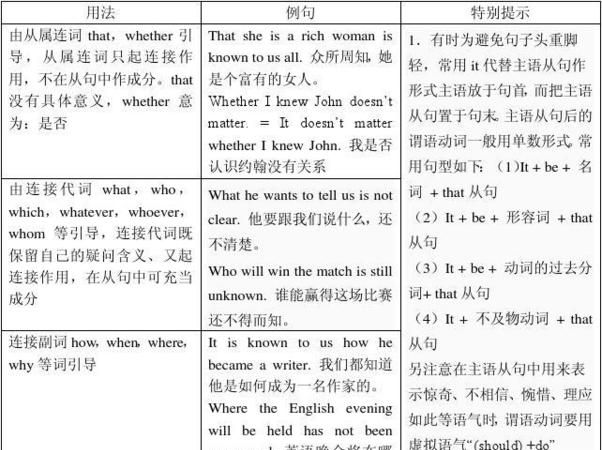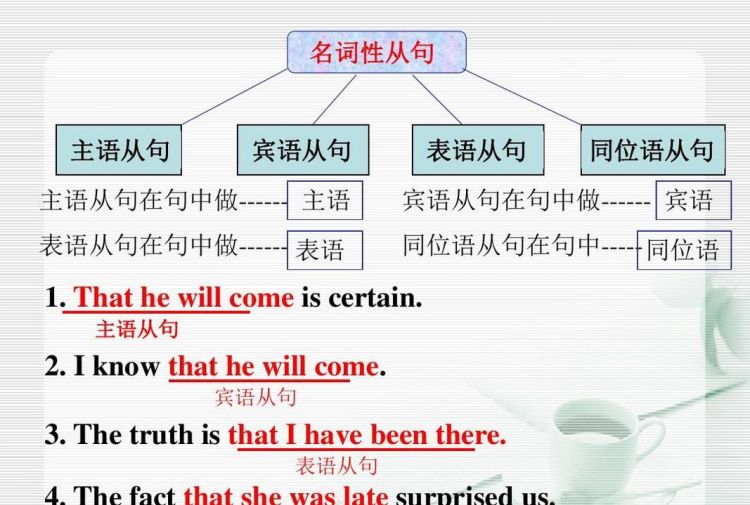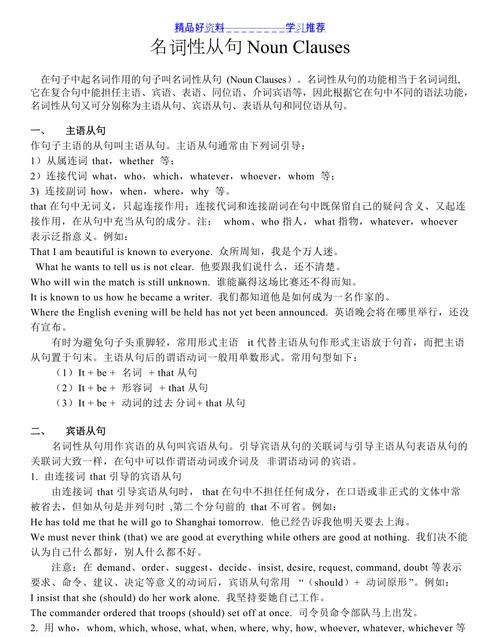本文目录
专升本英语语法知识点汇总
名词性从句是在 句子 中起名词作用的句子。 名词性从句的功能相当于名词词组, 它在复合句中能担任主语、宾语、表语、同位语、介词宾语等。下面就是我给大家带来的名词性从句英语语法知识点汇总,希望大家喜欢!
1 引导名词性从句的连接词
引导名词性从句的连接词可分为三类:
连接词:that,whether,if 不充当从句的任何成分)
连接代词:what, whatever, who, whoever, whom,
whose, which.
连接副词:when, where, how, why
不可省略的连词:
1. 介词后的连词
2. 引导主语从句和同位语从句的连词不可省略。
That she was chosen made us very happy.
We heard the news that our team had won.
比较:whether与if 均为"是否"的意思。 但在下列情况下,whether 不能被if 取代:
1. whether引导主语从句并在句首
2. 引导表语从句
3. whether从句作介词宾语
4. 从句后有"or not"
Whether he will come is not clear.
大部分连接词引导的主语从句都可以置于句末,用 it充当形式主语。
It is not important who will go.
It is still unknown which team will win the match.
2 名词性that-从句
1)由从属连词that引导的从句叫做名词性that-从句。 That只起连接主句和从句的作用,在从句中不担任任何成分,本身也没有词义。名词性that-从句在句中能充当主 语、宾语、表语、同位语和形容词宾语,例如:
主语:That he is still alive is sheer luck. 他还活着全靠运气。
宾语:John said that he was leaving for London on Wednesday. 约翰说他星期三要到伦敦去。
表语:The fact is that he has not been seen recently. 事实是近来谁也没有见过他。
同位语:The fact that he has not been seen recently disturbs everyone in his office.
近来谁也没有见过他,这一事实令办公室所有的人不安。
形容词宾语:I am glad that you are satisfied with your job.
你对工作满意我感到很高兴。
2)That-从句作主语通常用it作先行词,而将that-从句置于句末,例如:
It is quite clear that the whole project is doomed to failure. 很清楚,整个计划注定要失败。
It's a pity that you should have to leave. 你非走不可真是件憾事。
用it作形式主语的that-从句有以下四种不同的搭配关系:
a. It + be +形容词+ that-从句
It is necessary that… 有必要……
It is important that… 重要的是……
It is obvious that… 很明显……
b. It + be + -ed 分词+ that-从句
It is believed that… 人们相信……
It is known to all that… 从所周知……
It has been decided that… 已决定……
c. It + be +名词+ that-从句
It is common knowledge that… ……是常识
It is a surprise that… 令人惊奇的是……
It is a fact that… 事实是……
d. It +不及物动词+ that-分句
It appears that… 似乎……
It happens that… 碰巧……
It occurred to me that… 我突然想起……
3 名词性wh-从句
1)由wh-词引导的名词从句叫做名词性wh-从句。Wh-词包括who, whom,. whose, whoever, what, whatever, which, whichever等连接代词和where, when, how, why等连接副词。Wh-从句的语法功能除了和that-从句一样外,还可充当介词宾语、宾语补语和间接宾语等,例如:
主语: How the book will sell depends on its author. 书销售如何取决于作者本人。
直接宾语:In one's own home one can do what one likes. 在自己家里可以随心所欲。
间接宾语:The club will give whoever wins a prize.
俱乐部将给得胜者设奖。
表语: My question is who will take over president of the Foundation. 我的问题是谁将接任该基金会主席职位。
宾语补足语:She will name him whatever she wants to. 她高兴给他起什么名字就取什么名字。
同位语: I have no idea when he will return.
我不知道他什么时候回来。
形容词宾语:I'm not sure why she refused their invitation. 我尚不能肯定她为什么拒绝他们的邀请。
介词宾语: That depends on where we shall go.
那取决于我们去哪儿。
2)Wh-从句作主语也常用先行词it做形式主语,而将wh-从句置于句末,例如:
It is not yet decided who will do that job.
还没决定谁做这项工作。
It remains unknown when they are going to get married. 他们何时结婚依然不明。
4 if, whether引导的名词从句
1)yes-no型疑问从句
从属连词if, whether引导的名词从句是由一般疑问句或选择疑问转化而来的,因此也分别被称为yes-no型疑问句从句和选择型疑问从句,其功能和wh-从句的功能相同, 例如:
主语:Whether the plan is feasible remains to be proved. 这一计划是否可行还有等证实。
宾语:Let us know whether / if you can finish the article before Friday. 请让我们知道你是否能在星期五以前把 文章 写完。
表语:The point is whether we should lend him the money. 问题在于我们是否应该借钱给他。
同位语:They are investigating the question whether the man is trustworthy. 他们调查他是否值得信赖。
形容词宾语: She's doubtful whether we shall be able to come. 她怀疑我们是否能够前来。
介词宾语: I worry about whether he can pass through the crisis of his illness. 我担心他是否能度过疾病的危险期。
2)选择性疑问从句
选择性疑问从句由关联词if/whether…or或whethe…or not构成,例如:
Please tell me whether / if they are Swedish or Danish. 请告诉我他们是瑞典人还是丹麦人。
I don't care whether you like the plan or not.我不在乎你是否喜欢该计划。
5 否定转移
1) 将think, believe, suppose, expect, fancy, imagine等动词后面宾语从句的否定词转移到主句中,即主句的谓语动词用否定式,而从句的谓语动词用肯定式。
I don't think I know you. 我想我并不认识你。
I don' t believe he will come. 我相信他不回来。
注意:若谓语动词为hope,宾语从句中的否定词不能转移。
I hope you weren't ill. 我想你没有生病吧。
2) 将seem, appear 等后的从句的否定转移到前面。
It doesn't seem that they know where to go.
看来他们不知道往哪去。
It doesn't appear that we'll have a sunny day tomorrow.
看来我们明天不会碰上好天气。
3) 有时将动名词,介词 短语 或整个从句的否定转变为对谓语动词的否定。
I don't remember having ever seen such a man.
我记得从未见过这样一个人。 (not否定动名词短语 having…)
It's not a place where anyone would expect to see strange characters on the street.
在这里,人们不会想到在街上会碰上陌生的人。
(anyone 作主语,从句中的谓语动词不能用否定形式。)
4) 有时状语或状语从句中否定可以转移到谓语动词前。
The ant is not gathering this for itself alone. (否定状语) 蚂蚁不只是为自己采食。
He was not ready to believe something just because Aristotle said so. (否定because状语) 他并不因亚里斯多德说过如何如何,就轻信此事。
She had not been married many weeks when that man's younger brother saw her and was struck by her beauty. (否定状语many weeks) 她结婚还不到几个月,这个人的弟弟就看见她了,并对她的美貌着了迷。

名词性从句知识点归纳图
名词性从句相当于名词,可分别作主句的主语、表语、宾语和同位语。因此,名词性从句可分为主语从句、表语从句、宾语从句和同位从句。
一、引导名词性从句的连接词
1. 连接代词:who, whose, whom, what, which.有词义,在从句中担任成分,如主语、表语、宾语、或定语等。
2. 连接副词:when, where, why, how.有词义,在从句中担任成分,作状语。
3. 连接词:that, whether, if, as if.that 无词义,在从句中不担任成分,有时可省略;if (whether), as if虽有词义,但在从句中不担任成分。
注意:连接代词与连接副词在句中不再是疑问句,因而从句中谓语不用疑问式。连接代词与连接副词在从句充当句子成分,连接词whether 和if(是否),as if(好像)在从句中不充当句子成分,只起连接作用。根据句义,如果连接代词与连接副词,whether、if 和as if都用不上时,才用that作连接词(that本身无任何含义)。
二、主语从句
1. 主语从句在复合句作主语。
e.g. Who will go is not important.
2. 用it作形式主语,主语从句放在句末。
e.g. It doesn‘t matter so much whether you will come or not.
3. that引导主语从句时,不能省略。
e.g. That he suddenly fell ill last week made us surprised.
三、表语从句
1. 表语从句在复合句中作表语,位于系动词之后。
e.g. The question was who could go there.
2. 引导表语从句的连接词that有时可省去。
e.g. My idea is (that) we can get more comrades to help in the work.
四、宾语从句
1. 宾语从句在复合句中作宾语。引导宾语从句的连词that一般可省略。
e.g. I hope (that) everything is all right.
2. 介词之后的宾语从句,不可用which或if连接,要分别用what或 whether.
e.g. I’m interested in whether you‘ve finished the work……
I’m interested in what you‘ve said.
3. whether与if都可以引导宾语从句,常可互换。但下面情况不能互换。
(1)宾语从句是否定句时,只用if,不用whether.
e.g. I wonder if it doesn’t rain.
(2)用if 会引起误解,就要用whether.
e.g. Please let me know whether you want to go.(此句如果把whether改成if,容易当成条件句理解)
(3)宾语从句中的whether 与or not直接连用,就不能换成if;不直接连用,可换。
e.g. I don‘t know whether or not the report is true.
I don’t know whether/ if the report is true or not.
(4)介词后的.宾语从句要用whether引导。whether 可与不定式连用。whether也可引导主语从句、表语从句、同位语从句,还可引导让步状语从句,以上均不能换成if.但引导条件从句时,只能用if,而不能用whether.
e.g. It depends on whether we have enough time.
They don‘t know whether to go there.
Please come to see me if you have time.
五、同位语从句
同位语从句在句中作某一名词的同位语,一般位于该名词(如:news, fact, idea, suggestion, promise等)之后,说明该名词的具体内容。
e.g. I have no idea when he will be back.
The fact that he had not said anything surprised everybody.

有没有关于名词性从句的语法要点的题
名词性从句是由if, whether, that 和各种疑问词充当连接词所引导的从句,其功同名词一样。
一.主语从句
主语从句是在复合句中充当主语的从句,通常放在主句谓语动词之前或由形式主语it代替,而本身放在句子末尾。
1. It 作形式主语和it引导强调句的比较
It 作形式主语代替主语从句,主要是为了平衡句子结构,主语从句的连接词没有变化。而it引导的强调句则是对句子某一部分进行强调,无论强调的是什么成分,都可用连词that。被强调部分指人是也可用who/whom。例如:
It is a pity that you didn’t go to see the film.
It doesn’t interest me whether you succeed or not.
It is in the morning that the murder took place.
It is John that broke the window.
2. 用it 作形式主语的结构
(1) It is +名词+从句
It is a fact that … 事实是…
It is an honor that …非常荣幸
It is common knowledge that …是常识
(2) it is +形容词+从句
It is natural that… 很自然…
It is strange that… 奇怪的是…
(3) it is +不及物动词+从句
It seems that… 似乎…
It happened that… 碰巧…
(4) it +过去分词+从句
It is reported that… 据报道…
It has been proved that… 已证实…
3. 主语从句不可位于句首的五种情况
(1) if 引导的主语从句不可居于复合句句首。
(2) It is said , (reported) …结构中的主语从句不可提前。例如:
It is said that President Jingo will visit our school next week. (right)
That President Jiang will visit our school next week is said. (wrong)
(3) It happens…, It occurs… 结构中的主语从句不可提前。例如:
It occurred to him that he failed in the examination. (right)
That he failed in the examination occurred to him. (wrong)
(4) It doesn’t matter how/whether …结构中的主语从句不可提前。例如:
It doesn’t matter whether he is wrong or not. (right)
Whether he is wrong or not doesn’t matter. (wrong)
(5) 含主语从句的复合句是疑问句时,主语从句不可提前。例如:
Is it likely that it will rain in the evening? (right)
Is that will rain in the evening likely? (wrong)
4. What 与that 在引导主语从句时的区别
What 引导主语从句时在句时在从句中充当句子成分,如主语.宾语.表语,而that 则不然。例如:
1) What you said yesterday is right.
2) That she is still alive is a consolation.
二.宾语从句
宾语从句就是在复合句中作宾语的名词性从句,通常放在主句谓语动词(及物动词)或介词之后。
1. 作动词的宾语
(1) 由that引导的宾语从句(that 通常可以省略),例如:
I heard that be joined the army.
(2) 由what, whether (if) 引导的宾语从句,例如:
1) She did not know what had happened.
2) I wonder whether you can change this note for me.
(3) 动词+间接宾语+宾语从句。例如:
She told me that she would accept my invitation.
2. 作介词的宾语
例如:Our success depends upon how well we can cooperate with one another.
3. 作形容词的宾语
例如:I am afraid (that) I’ve made a mistake.
That 引导的从句常跟在下列形容词后作宾语:
Anxious, aware, certain, confident, convinced, determined, glad, proud, surprised, worried, sorry, thankful, ashamed, disappointed, annoyed, pleased, hurt, satisfied, content 等。也可以将此类词后的that 从句的看作原因状语从句。
4. It 可以作为形式宾语
It 不仅可以作为形式主语,还可以作为形式宾语而真正的宾语that 从句则放在句尾,特别是在带复合宾语的句子中。 例如:
We heard it that she would get married next month..
5. 后边不能直接跟that 从句的动词
这类动词有Allow, refuse, let, like, cause, force, admire, condemn, celebrate, dislike, love, help, take, forgive等。这类词后可以用不定式或动名词作宾语,但不可以用that引导的宾语从句。例如:
I admire their winning the match. (right)
I admire that they won the match. (wrong)
6. 不可用that从句作直接宾语的动词
有些动词不可用于“动词+间接宾语+that从句“结构中,常见的有Envy, order, accuse, refuse, impress, forgive, blame, denounce, advise, congratulate等。例如:
He impressed the manager as an honest man. (right)
He impressed the manager that he was an honest man. (wrong)
7. 否定的转移
若主句谓语动词为Think, consider, wuppose, believe, expect, fancy, guess, imagine等,其后的宾语从句若含有否定意义,一般要把否定词转移到主句谓语上,从句谓语用肯定式。例如:
I don’t think this dress fits you well.(我认为这件衣服不适合你穿。)
三.表语从句
表语从句在复合句中作表语的名词性从句,放在系动词之后,一般结构是“主语+连系动词+表语从句”。可以接表语从句的连系动词有be, look, remain, seem等。引导表语从句的that常可省略。另外,常用的还有the reason is that… 和It is because 等结构。例如:
1) The question is whether we can make good preparation in such a short time.
2) This is why we can’t get the support of the people
3) But the fact remains that we are behind the other classes.
4) The reason he is late for school is that he missed the early bus.
四.同位语从句
同位语从句就是在复合句中作名词的同位语的名词性从句。
1. 同位语从句的功能
同位语从句对于名词进一步解释,说明名词的具体内容,一般由that引导,例如:
1) The king’s decision that the prisoner would be set free surprised all the people.
2) The order that all the soldiers should stay still is given by the general.
2. 同位语在句子中的位置
同位语从句有时可以不紧跟在它所说明的名词后面,而是被别的词隔开。例如:
He got the news from Mary that the sports meeting was put off.
3. 同位语从句与定语从句的区别
(1) 定语从句中的that既代替先行词,同时以在从句中作某个成分(主语或宾语),而同位语从句中的that是连词,只起连接主句与从句的作用,不充当句中任何成分。
(2) 定语从句是形容词性的,其功能是修饰先行词,对先行词加以限定,描述定的性质或特征;同位语从句是名词性的,其功能是对名词进行补充说明。例如:
1) The news that he told me is that Tom would go abroad next year.(他告诉我的消息是汤姆明年将出国。)(第一个that引导的从句是定语从句,that在从句中作宾语)
2)The news that Tom would go abroad is told by him.(汤姆将出国的消息是他讲的。)(同位语从句,that在句中不作任何成分)

英语主语从句语法详解

(1)名词性从句(归属于名词类):
主语从句
表语从句
宾语从句
同位语从句
(2)形容词性从句(起描绘名词的修饰作用,归属于形容词类):
定语从句
(3)副词性从句(起描绘谓语动词的修饰作用,归属于副词类):
状语从句
1.名词性从句
1.1主语从句——一般们于句子的开头,以从属连词引导。
•连接主语从句的连词
纯连词:that(不有词义,只起连接作用,在从句中不充当成分)
whether
连接副词:when, where, how, why
连接代词:what, whatever, who, whoever, which
That Jack got an A for his physics is a surprise.
杰克的物理得了优秀真是令人惊喜的。
That July went to New York is no news now.
朱莉去纽约一事可不是什么新闻了。
注意,此类主语从句通常必成以下形式,显得更平衡自然一些:
It is surprise that Jack got an A for hisphysics.
It is no news now that July went to NewYork.
此类从句中的that是不能省略的,因为省去that后就不看出是从句了。
Whether she agrees or not is nothing to me.
她是否同意对我毫无影响。
Whether we come or not depends on the weather.
我们是否来取决于天气。
此类主语从句中的whether既起连接作用,又有意思,不能省略。
特别需要注意的是:
用whether引导的主语从句,不能使用if代替:
×If she agrees or no is nothing to me.
×If we come or not depends on the wether.
When we set out is not decided yet.
我们何时出发还没定下来呢。
How she succeeded remains a secret.
他怎么成功的仍然是一个秘密。
Where Bob chooses to stay is up to him.
鲍勃选择在哪里居住由他自己决定。
What the teacher stressed will be in the exam paper.
老师强调的内容会出现在考卷中。
Who is the new teacher matters a lot.
谁当新教师关系可大了。
本文载自微信公众号“英语语法学习”。本文已获转载授权,版权归作者所有,如需转载,请联系原微信公众号“英语语法学习”。
公众号:英语语法学习

以上就是关于名词性从句语法点 ,专升本英语语法知识点汇总的全部内容,以及名词性从句语法点 的相关内容,希望能够帮到您。

